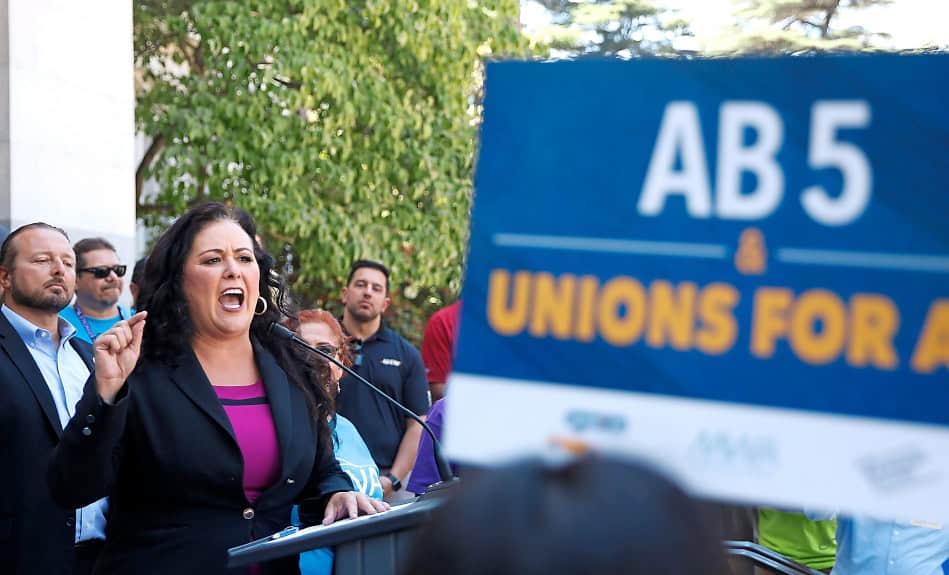This article was originally published on The Orange County Register.
With the 2020 election now (mostly) in the rearview mirror, one outcome stands out as uniquely bittersweet. This cycle, California voters approved the much-discussed Proposition 22—which exempted some “gig economy” companies, such as Uber and Lyft, from being forced to classify their drivers as employees.
Ultimately, Prop. 22 was a direct reaction to another California law, AB5, which passed earlier this year. Touted as a measure to “protect” workers from the business arrangements that they had made for themselves, the law created a new three-part test to determine whether someone was an employee or an independent contractor—essentially redefining those categories and expanding the employee classification far beyond what is generally accepted elsewhere.
Proponents of the law claimed that many workers, like drivers for Uber and Lyft, were unfairly classified as independent contractors—letting companies off the hook when it comes to a variety of labor laws that apply only to employees, such as minimum wage requirements and other mandated benefits.
After AB5’s passage, countless independent contractors and freelance workers across a variety of industries pushed to be exempted from the new law before it could overturn the various work arrangements to which they had agreed. Some categories of workers were already exempted within AB5 itself and some politically favored industries were able to effectively lobby policymakers and also exempt themselves from the new law in follow-up legislation. Other workers were not so lucky.
Unable to secure an exemption from the law and recognizing that compliance would essentially prohibit their business model, Uber, Lyft, DoorDash, and other “gig economy” companies that rely on independent contractors banded together to come up with an alternative. Prop. 22 cemented the status of these “gig economy” workers as independent contractors while also extending to them certain benefits and protections typically reserved for employees. Most notably, Prop. 22 guarantees workers a pay rate of at least 120 percent of the minimum wage while on the job, a healthcare stipend, certain occupational-related insurance protections, and protection from discrimination and harassment.
First, the good news: Because Californians approved Prop. 22, hundreds of thousands of workers earning income from these companies will be able to continue to do so, which is especially important in the midst of a global pandemic. Also, their flexibility in setting their own work schedules is also almost certain to be preserved, while they secured other benefits.
But it’s not all good news. The line between independent contractors and employees in California is now even murkier. Furthermore, Prop. 22 only applies to “app-based ride-share and delivery drivers” rather than “gig economy” workers as a whole. This leaves many workers, who either don’t fit under the parameters of Prop. 22 or qualify for a special exemption, still dealing with the consequences of AB5—something that’s unlikely to change anytime soon. Perhaps the worst outcome of Prop. 22 is the removal of significant political pressure to repeal AB5, all but ensuring that the law will stand.
Now, the ugly: by not repealing it entirely, Prop. 22 accommodates AB5, thereby preserving the core idea that adults are incapable of making decisions for themselves about the types of business or work arrangements that they prefer. For years, various consultants, freelance writers, musicians, and other workers in white-collar professions were able to make these decisions as independent contractors. Now, just when technology made such flexibility available to a wider population of workers, new laws are here to disrupt them —unless, that is, these professions can either get themselves exempted or find themselves under the purview of a company wealthy enough to carve out their own middle ground.
It’s not too late, however, to go another way. There is a reason so many people worked so hard to exempt themselves from California’s AB5 — people appreciate flexibility. In a world where an increasingly large number of products can be tailored and customized, it’s no surprise that people enjoy the freedom to make their own work arrangements, set their own schedules, and otherwise exercise more control over what their work-life balance will be.
A recent Archbridge Institute survey asked people to rate different statements as essential, important but not essential, or not important to their view of the American Dream. 82 percent of respondents rated “Freedom of choice in how to live” as essential to the American Dream, more than any other statement. Interestingly, only 13 percent of respondents rated “becoming wealthy” as an essential part of the American Dream.
We need to respect our fellow Americans and treat them with dignity. The best place to start is by acknowledging that they know how to navigate the trade-offs between work, pay, and flexibility better than a third party ever could.


